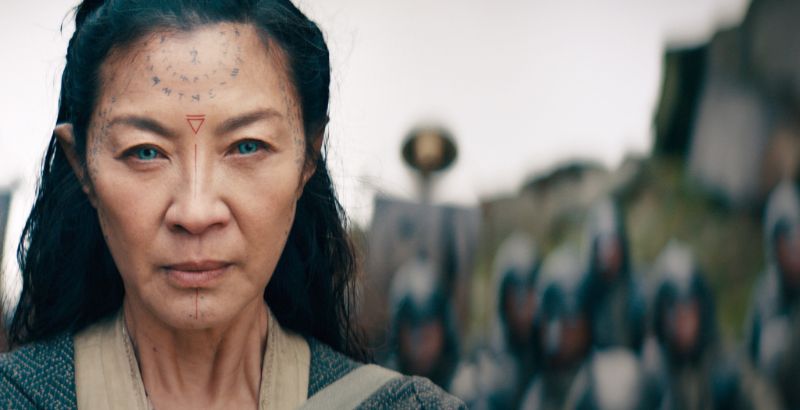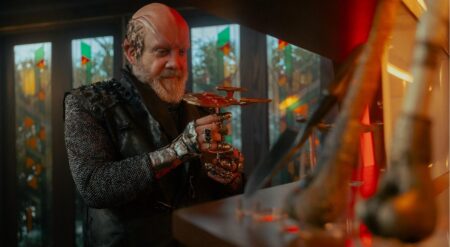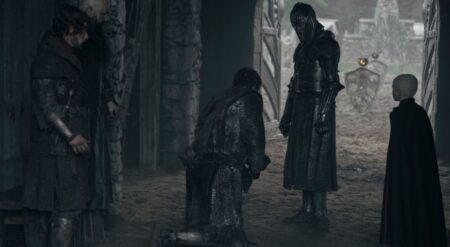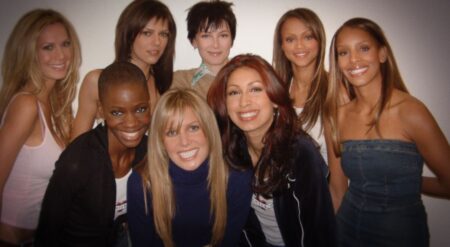
First a book series, then a video game, and now a series, The Witcher has captivated audiences across mediums. With The Witcher: Blood Origin, Netflix is looking to expand the television universe and lore of the franchise. Created and showrun by Declan De Barra (who also serves as a writer on multiple episodes), the mini-series is directed by Vicky Jewson and Sarah O’Gorman, and features writing credits for Tania Lotia, Sophia Brown, Alex Meenehan, Aaron Stewart-Ahn, and Kiersten Van Horne. The Witcher: Blood Origin stars Michelle Yeoh, Nathaniel Curtis, Lenny Henry, Dylan Moran, Laurence O’Fuarain, and Francesca Mills.
This prequel to The Witcher is set in an elven world 1200 years before the events of the main series. Blood Origin tells a story lost to time and retold because the time is right. More typical fantasy than the main series, Blood Origins focuses on a group of seven individuals fighting against an empire and an unstoppable power within its walls. Taking place before monsters and man, the conflict of this series brings about the “conjunction of the spheres,” when the worlds of monsters, men, and elves merge to become one. But the joining of worlds isn’t the only piece of history on display, and so is the creation of the first Witcher.
The Witcher: Blood Origin is a strong mini-series thanks in larger part to its cast of characters that each represent different tropes across fantasy. The Lark, Éile (Sophia Brown), is scorned by her clan for choosing to become a bard instead of being the elite warrior she was trained to be. Pushed to violence instead of song, she’s the centerpiece of the Blood Quest the group is on and its heart. Scian of Ghost Tribe (Michelle Yeoh) is the last of her clan and Éile’s sword mother, now a sell-sword. The very last of her nomadic tribe of sword-elves, when a chance presents itself to retrieve a stolen sacred sword taken from her fallen tribe she launches herself into the quest. Fjall of Dog Clan (Laurence O’Fuarain) is a disgraced warrior who pledged to protect royalty is now on a path of vengeance to heal from his grief and find redemption.
Outside of these main there, the last four also deserve their time in the spotlight. Meldof (Francesca Mills) is a dwarf whose only purpose in life is to avenge her lover Gwen. Brother Death and Zacaré are a pair moved to fight the empire to avenge their people. Syndril is a mage who escaped the empire’s imprisonment and knows the danger of entering the towers under Balor’s (Lenny Henry) commands. And across these seven, we see a party form with different skills and reasons to fight the Empress Merwyn (Mirren Mack)—some personal, and others looking to fight for the larger good of the world. But more importantly, none of them are like the characters we’ve seen in The Witcher world.
With a stacked cast of personality and skill, Sophia Brown’s performance as the Lark is fantastic. She is the catalyst, the heart, and able to showcase the power of violence against oppressors and the importance of telling stories. The choice to make the Lark’s story blend the storytelling of a bard and the fighting of a warrior in equal measure without obscuring the importance both play in her life is what makes her shine as a character.
Michelle Yeoh has been an action icon for decades. She is a forceful and graceful presence, and she overwhelms every fight sequence she is in, in the best ways. From her costuming and role in the story to her infallible skill with a sword, Yeoh as Scian is perfect. Additionally, Yeoh is just the tip of the action iceberg. Like The Witcher, Blood Origins gives its action sequences space to breathe, allowing the audience to see the entire scene instead of close-in jump cuts. This choice also allows for each actor of our seven to show their physicality. Even while Mills’s first fight sequence is off camera, she gets her due in the last two episodes. Fantasy is of course, the main focus of the series, but the action is sublime.

Beyond the characters, their beauty, and their power, Blood Origin is a series that manages to connect to expand the world 1200 years in the past while still connecting to the main series. My only critique of the series is that it’s too short. With so much history and so many characters to explore, four episodes aren’t enough to let the story breathe. Instead, the pacing of the series jumps quickly, and we’re left with characters that have so much to offer but with only a small amount of potential explored.
Additionally, the fast-paced nature also means that any larger critique of empire building goes explored only on the surface instead of being grasped firmly and deconstructed. This lack of exploration makes it hard for the larger emotional impacts of the final episode to resonate. Yes, the series thrives on its connection with people, but more time would have allowed the audience to see how they connect to their world and its history to put the series into “perfect” territory. Instead, it feels unfinished, with more to be said and explored.
It’s clear how vast and interesting the world of The Witcher is and can be. Even with this, though, Blood Origin doesn’t lose its unique voice. The main theme for the mini-series is all about the power of storytelling. This is a win for anyone in love with bards from D&D and beyond, but more importantly, it allows the franchise to keep building on itself. Stories can be forgotten but also remembered. I want more of The Witcher: Blood Origin’s characters, and I hope we get it.
The Witcher: Blood Origins is streaming exclusively on Netflix December 25, 2022.
The Witcher: Blood Origins
-
Rating - 8/108/10
TL;DR
It’s clear how vast and interesting the world of The Witcher is and can be. Even with this, though, Blood Origin doesn’t lose its unique voice. The main theme for the mini-series is all about the power of storytelling. This is a win for anyone in love with bards from D&D and beyond, but more importantly, it allows the franchise to keep building on itself. Stories can be forgotten but also remembered. I want more of The Witcher: Blood Origin’s characters, and I hope we get it.






